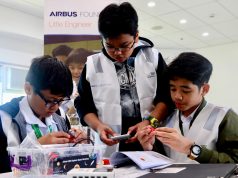(Updated May 8, 2024; 1:27 p.m.) Many companies only push women representation in the workplace during special events such as International Women’s Month or Mother’s Day.
But EY GDS Philippines, the global delivery network working to provide business solutions to EY member firms and clients worldwide, is proving that there are benefits to be had if organizations support women, both in the workplace and outside of it.
Among their advocacies: encourage women to study and, hopefully, join the STEM (science, technology, engineering, and mathematics) field as professionals. This, in the hopes of eradicating the misconception that women are not suited for certain fields or professions.
Pamela Repotente, EY GDS Philippines SAP Practice Leader, said that there is definitely still a perception locally and even regionally that men are more suited for technology-related jobs compared to women. Young girls are often told by parents or mentors to pursue careers in health or education as these are fields commonly associated with women.
Local and international surveys prove that women stick to careers that are commonly perceived as female or feminine jobs.
The Philippines ranked 16th in the Global Gender Gap Index, an indication that the gap between women and men in the Philippines has improved across areas of health, education, economy and politics.
But a report using data from the Philippines Statistic Authority found that fewer Filipino women belong to the work force compared to men. Women, the report adds, are mostly employed in wholesale and retail and the personal hygiene goods industry.
In the US, its Department of Labor said in a 2024 survey that registered nurses and elementary and middle school teachers are the top two most comment occupations for Women
This should be corrected, she explained, as such a belief can limit the educational and professional opportunities for women.
“One of the problems we’re seeing not just in the Philippines but globally is that there are not enough women role models in the workplace—especially in technology,” Repotente said in an interview with Interaksyon.
This problem can be traced back to education, said Maez De Guzman, EY GDS Philippine Cybersecurity leader.
Based on EY’s study in the Philippines, four out of ten students pursue STEM tracks and courses in senior high school and college.
“And on that four out of 10, 40% are women,” De Guzman said.
De Guzman added that majority of that 40% go into sciences and mathematics, with only a small portion of it pursuing technology courses.
She also said that according to EY’s research, only 28% of women globally are in STEM fields.
The evident gap is a missed opportunity, said EY GDS Tax leader Priyanka Chaudhry, especially with how technology is heavily engrained in many aspects of Filipino lives.
Chaudhry shared that her STEM background allowed her to integrate technology in tax and her taxation tasks for EY.
“Both men and women can learn the same things in school and apply it in their day-to-day life. I don’t think there is a difference. It’s just a matter of perception,” Chaudhry said.
“Pursuing education in STEM can open up career paths and progression opportunities,” she said.
Gamified, targeted learning
One way EY is pushing the agency of encouraging women to pursue the STEM track is through its EY STEM app.
Built by EY, the EY STEM is an educational app that aims to teach users—particularly students ages 13 to 18, although everyone is free to use it—STEM lessons and concepts through mobile games and gamified modules.
“In this app, you can actually have a unified environment wherein you can learn those concepts of STEM. The app allows you to enter the field knowing how to start STEM when you see STEM,” Repotente said.
Upon registering, users are asked to choose which “career” they are interested in—not just technology or science. The app customizes the lessons based on this choice to better suit the needs and interests of its users.
De Guzman said that the app is made to equip users with STEM concepts that can give them a better understanding of what skills are needed in the field.
She also shared that, she is often asked by young students and professionals what they should study or take up in college if they want to pursue a career in cyber security. The EY STEM app can be an entryway for students, De Guzman said.
It is much-needed supplementary education for female students who may not be getting the necessary support or information in the traditional classroom. And since it is gamified, the app can be used by anyone.
“I think the STEM initiative is a way of EY telling the young aspirants that there is really a path in technology for women,” De Guzman said.
An inclusive culture
It’s also important to have an inclusive work culture that supports women and allows them to excel—and, of course, take up top leadership roles.
EY Philippines’ diversity index is at 60%, which means the company implements the advocacy they are pushing. Janet Truncale will serve as global CEO in July 2024—making EY one of the few major professional service networks to be headed by a woman.
Locally, De Guzman, Repotente, and Chaudhry hope that their positions as leaders for a top multinational company in the Philippines will served as inspiration—not just for women entering the STEM field, but women in the work force in general.
De Guzman and Repotente admit that they experienced discrimination because of their gender when they were starting out—something that was all too common in a field perceived to be male-centric.
De Guzman believes that “being out there and showing the world that you can actually be a woman and you’re in tech” can serve as needed inspiration.
“When someone sees a certain type of person in a key leadership role or maybe a position that they would think, I can do that as well,” De Guzman added, adding that there is need to highlight stories of women beyond token events like Mother’s Day.
“I’m given this role, right? And this role is, you use it in a way to inspire people. And that’s always been my wish. I want to be able to inspire, be an inspiration to people to pursue careers or whatever way I can inspire them,” Repotente said.
“Technology is everywhere. So it should involve everyone—including women,” Chaudry said.







